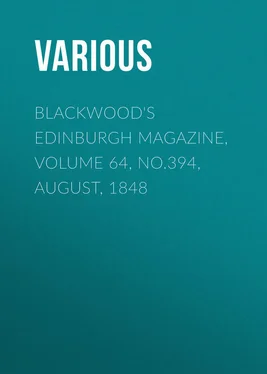Various - Blackwood's Edinburgh Magazine, Volume 64, No.394, August, 1848
Здесь есть возможность читать онлайн «Various - Blackwood's Edinburgh Magazine, Volume 64, No.394, August, 1848» — ознакомительный отрывок электронной книги совершенно бесплатно, а после прочтения отрывка купить полную версию. В некоторых случаях можно слушать аудио, скачать через торрент в формате fb2 и присутствует краткое содержание. Издательство: Иностранный паблик, Жанр: periodic, foreign_edu, Путешествия и география, на английском языке. Описание произведения, (предисловие) а так же отзывы посетителей доступны на портале библиотеки ЛибКат.
- Название:Blackwood's Edinburgh Magazine, Volume 64, No.394, August, 1848
- Автор:
- Издательство:Иностранный паблик
- Жанр:
- Год:неизвестен
- ISBN:нет данных
- Рейтинг книги:5 / 5. Голосов: 1
-
Избранное:Добавить в избранное
- Отзывы:
-
Ваша оценка:
- 100
- 1
- 2
- 3
- 4
- 5
Blackwood's Edinburgh Magazine, Volume 64, No.394, August, 1848: краткое содержание, описание и аннотация
Предлагаем к чтению аннотацию, описание, краткое содержание или предисловие (зависит от того, что написал сам автор книги «Blackwood's Edinburgh Magazine, Volume 64, No.394, August, 1848»). Если вы не нашли необходимую информацию о книге — напишите в комментариях, мы постараемся отыскать её.
Blackwood's Edinburgh Magazine, Volume 64, No.394, August, 1848 — читать онлайн ознакомительный отрывок
Ниже представлен текст книги, разбитый по страницам. Система сохранения места последней прочитанной страницы, позволяет с удобством читать онлайн бесплатно книгу «Blackwood's Edinburgh Magazine, Volume 64, No.394, August, 1848», без необходимости каждый раз заново искать на чём Вы остановились. Поставьте закладку, и сможете в любой момент перейти на страницу, на которой закончили чтение.
Интервал:
Закладка:
The misery entailed upon these unhappy people by the illicit traffic must be seen to be fully appreciated. Before the effects of the poisonous "fire-water," they disappear from the earth like "snow before the sun;" and knowing the destruction it entails upon them, the poor wretches have not moral courage to shun the fatal allurement it holds out to them, of wild excitement and a temporary oblivion of their many sufferings and privations. With such palpable effects, it appears only likely that the illegal trade is connived at by those whose policy it has ever been gradually but surely to exterminate the Indians, and by any means extinguish their title to the few lands they now own on the outskirts of civilisation. Certain it is that large quantities of liquor find their way annually into the Indian country, and as certain are the fatal results of the pernicious system, and that the American government takes no steps to prevent it. There are some tribes who have as yet withstood the great temptation, and have resolutely refused to permit liquor to be brought into their villages. The marked difference between the improved condition of these, and the moral and physical abasement of those tribes which give way to the fatal passion for drinking, sufficiently proves the pernicious effects of the liquor trade on the unfortunate and abused aborigines; and it is matter of regret that no philanthropist has sprung up in the United States to do battle for the rights of the Red man, and call attention to the wrongs they endure at the hands of their supplanters in the lands of their fathers.
Robbed of their homes and hunting-grounds, and driven by the encroachments of the whites to distant regions, which hardly support their bare existence, the Indians, day by day, are gradually decreasing before the accumulating evils, of body and soul, which their civilised persecutors entail upon them. With every man's hand against them, they drag on to their final destiny; and the day is not far distant when the American Indian will exist only in the traditions of his pale-faced conquerors.
The Indians who were trading at this time on the Platte were mostly of the Sioux nation, including the tribes of Burnt-woods, Yanka-taus, Pian-Kashas, Assinaboins, Oglallahs, Broken Arrows, all of which belong to the great Sioux nation, or La-cotahs, as they call themselves, and which means cut-throats. There were also some Cheyennes allied to the Sioux, as well as a small band of Republican Pawnees.
Horse-racing, gambling, and ball-play, served to pass away the time until the trade commenced, and many packs of dressed robes changed hands amongst themselves. When playing at the usual game of " hand ," the stakes, comprising all the valuables the players possess, are piled in two heaps close at hand, the winner at the conclusion of the game sweeping the goods towards him, and often returning a small portion "on the prairie," with which the loser may again commence operations with another player.
The game of "hand" is played by two persons. One, who commences, places a plum or cherry-stone in the hollow formed by joining the concaved palms of the hands together, then shaking the stone for a few moments, the hands are suddenly separated, and the other player must guess which hand now contains the stone.
Large bets are often wagered on the result of this favourite game, which is also often played by the squaws, the men standing round encouraging them to bet, and laughing loudly at their grotesque excitement.
A Burnt-wood Sioux, Tah-tunga-nisha, and one of the bravest chiefs of his tribe, when a young man, was out on a solitary war expedition against the Crows. One evening he drew near a certain "medicine" spring, where, to his astonishment, he encountered a Crow warrior in the act of quenching his thirst. He was on the point of drawing his bow upon him, when he remembered the sacred nature of the spot, and making the sign of peace, he fearlessly drew near his foe, and proceeded likewise to slake his thirst. A pipe of kinnik-kinnik being produced, it was proposed to pass away the early part of the night in a game of "hand." They accordingly sat down beside the spring, and commenced the game.
Fortune favoured the Crow. He won arrow after arrow from the Burnt-wood brave; then his bow, his club, his knife, his robe, all followed, and the Sioux sat naked on the plain. Still he proposed another stake against the other's winnings – his scalp. He played, and lost; and bending forward his head, the Crow warrior drew his knife and quickly removed the bleeding prize. Without a murmur the luckless warrior rose to depart, but first exacted a promise from his antagonist, that he would meet him once more at the same pot, and engage in another trial of skill.
On the day appointed, the Burnt-wood sought the spot, with a new equipment, and again the Crow made his appearance, and they sat down to play. This time fortune changed sides, and the Sioux won back his former losses, and in his turn the Crow was stripped to his skin.
Scalp against scalp was now the stake, and this time the Crow submitted his head to the victorious Burnt-wood's knife; and both the warriors stood scalpless on the plain.
And now the Crow had but one single stake of value to offer, and the offer of it, he did not hesitate to make. He staked his life against the other's winnings. They played; and fortune still being adverse, he lost. He offered his breast to his adversary. The Burnt-wood plunged his knife into his heart to the very hilt; and, laden with his spoils, returned to his village, and to this day wears suspended from his ears his own and enemy's scalp.
The village presented the usual scene of confusion as long as the trade lasted. Fighting, brawling, yelling, dancing, and all the concomitants of intoxication, continued to the last drop of the liquor-keg, when the reaction after such excitement was almost worse than the evil itself. During this time, all the work devolved upon the squaws, who, in tending the horses, packing wood and water from a long distance, had their time sufficiently occupied. As there was little or no grass in the vicinity, the animals were supported entirely on the bark of the cotton-wood; and to procure this, the women were daily engaged in felling huge trees, or climbing them fearlessly, chopping off the upper limbs, – springing like squirrels from branch to branch, which, in their confined costume, appeared matter of considerable difficulty.
The most laughter-provoking scenes, however, were, when a number of squaws sallied out to the grove, with their long-nosed, wolfish-looking dogs harnessed to their travées or trabogans, on which loads of cotton-wood were piled. The dogs, knowing full well the duty required of them, refuse to approach the coaxing squaws, and, at the same time, are fearful of provoking their anger by escaping and running off. They, therefore, squat on their haunches, with tongues hanging out of their long mouths, the picture of indecision, removing a short distance as the irate squaw approaches. When once harnessed to the travée, however, which is simply a couple of lodge-poles lashed on either side of the dog, with a couple of cross-bars near the ends to support the freight, they follow quietly enough, urged by bevies of children, who invariably accompany the women. When arrived at the scene of their labours, the reluctance of the curs to draw near the piles of cotton-wood is most comical. They will lie down stubbornly at a little distance, whining their uneasiness, or sometimes scamper off bodily, with their long poles trailing after them, pursued by the yelling and half frantic squaws.
When the travées are laden, the squaws take the lead, bent double under loads of wood sufficient to break a porter's back, and calling to the dogs, which are urged on by the buffalo-fed urchins in rear, take up the line of march. The curs, taking advantage of the helpless state of their mistresses, turn a deaf ear to their coaxings, lying down every few yards to rest, growling and fighting with each other, in which encounters every cur joins, the mêlée , charging pell-mell into the yelping throng; upsetting the squalling children, and making confusion worse confounded. Then, armed with lodge-poles, the squaws, throwing down their loads, rush to the rescue, dealing stalwart blows on the pugnacious curs, and finally restoring something like order to the march.
Читать дальшеИнтервал:
Закладка:
Похожие книги на «Blackwood's Edinburgh Magazine, Volume 64, No.394, August, 1848»
Представляем Вашему вниманию похожие книги на «Blackwood's Edinburgh Magazine, Volume 64, No.394, August, 1848» списком для выбора. Мы отобрали схожую по названию и смыслу литературу в надежде предоставить читателям больше вариантов отыскать новые, интересные, ещё непрочитанные произведения.
Обсуждение, отзывы о книге «Blackwood's Edinburgh Magazine, Volume 64, No.394, August, 1848» и просто собственные мнения читателей. Оставьте ваши комментарии, напишите, что Вы думаете о произведении, его смысле или главных героях. Укажите что конкретно понравилось, а что нет, и почему Вы так считаете.












